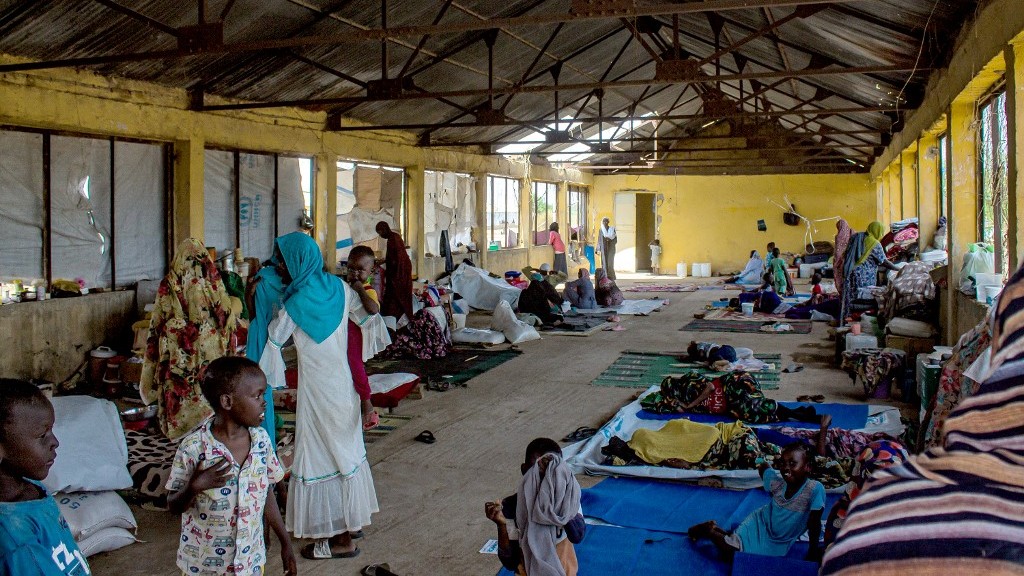Sudan: Children as young as 12 raped in 'alarming numbers'

Children as young as 12 are being raped and sexually assaulted by fighters in Sudan in "alarming numbers," according to a new report released by Save the Children.
The NGO said on Friday at least 88 cases of rape have been verified since the conflict between the Sudanese Armed Forces (SAF) and the paramilitary Rapid Support Forces (RSF) started on 15 April, with women and girls, in particular, facing assault and exploitation.
Officials expect there have been as high as 4,400 cases of sexual violence.
Examples of the abuses faced by children and teenagers include rape, which has caused pregnancies in some cases, as well as kidnappings.
“Sexual violence continues to be used as a tool to terrorise women and children in Sudan. We know that the official numbers are only the tip of the iceberg," Arif Noor, Save the Children's director in Sudan, said in a statement.
Stay informed with MEE's newsletters
Sign up to get the latest alerts, insights and analysis, starting with Turkey Unpacked
“Every child, no matter where they live, deserves to live a safe, happy, and healthy life, free from violence,” Noor added.
Before the conflict in Sudan broke out nearly three months ago, gender-based violence in the country was widespread, with over three million women and girls prone to it, according to Save the Children.
These figures have now escalated, with some children being specifically targeted for their gender and ethnicity.
'Every child, no matter where they live, deserves to live a safe, happy and healthy life, free from violence'
- Arif Noor, Save the Children
Earlier this week, senior United Nations officials condemned the sexual violence taking place in the country and called for prompt investigations.
The UN’s human rights office in Sudan found reports of 21 incidents of conflict-related sexual violence against at least 57 women and girls. In one case, they found as many as 20 women were reportedly raped in the same attack.
The UN emphasised that all parties must respect international humanitarian law and human rights, allowing a safe passage for survivors to access healthcare.
“It is unconscionable that Sudan’s women and children - whose lives have been upended by this senseless conflict - are being further traumatised in this way,” Martin Griffiths, the UN under secretary-general for humanitarian affairs and emergency relief coordinator said in a statement.
“What we are witnessing in Sudan is not just a humanitarian crisis, it is a crisis of humanity,” he added.
Physical and mental trauma
Staff working for Save the Children in north Kordofan say that they are seeing at their mobile health clinics a rising number of cases of women affected by sexual violence.
Many women and children face trauma, both physical and mental, following the assaults.
Young girls are reported to suffer from uterine prolapses, fistula, and other injuries to their reproductive system, and face complications and death due to early pregnancy and unsafe abortions.
For underdeveloped girls, this can have long-term consequences on their physical health.
Staff working for Save the Children warn that it is also becoming increasingly difficult to cope with the growing number of cases.
“The emergency unit at the main hospital was hit during an air strike and we do not have any good hospitals here now where we can refer serious medical cases for further investigation,” Sara Abdelrazig, the organisation's head of implementation said.
Noor said that they have also heard reports of parents being forced to marry off their children at a young age, to "protect" them from further risks of sexual violence.
“This is a hideous and terrifying situation for girls to be in,” he said.
Long-lasting impact
Sexual violence in Sudan is significantly underreported, with experts believing exact figures of gender-based violence to be much higher than what is often reported.
Survivors can be deterred from detailing what happened to them due to feelings of shame, fear of reprisal, and because of social stigmas in the country.
The lack of humanitarian access, coupled with an unstable internet connection also makes communication difficult as well as getting proper access and support to victims.
Survivors also experience challenges in accessing health services and medication.
Gender-based violence and sexual assault can have long-term effects, particularly on children, who many go on to experience post-traumatic stress disorder.
Healthcare and social workers warn that women and children who are fleeing or have been displaced and are searching for safety are particularly prone to facing acts of sexual violence.
Middle East Eye delivers independent and unrivalled coverage and analysis of the Middle East, North Africa and beyond. To learn more about republishing this content and the associated fees, please fill out this form. More about MEE can be found here.






.jpg.webp?itok=9CxE7_iF)